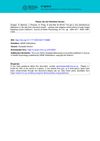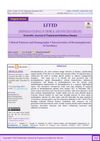 7 citations,
January 2022 in “Animal Reproduction”
7 citations,
January 2022 in “Animal Reproduction” Using rodents for research shows that health problems in the womb can cause diseases later in life.
[object Object]  6 citations,
September 2017 in “Journal of health psychology”
6 citations,
September 2017 in “Journal of health psychology” Women who had cancer treatment feel both positive and negative about their bodies.
 6 citations,
August 2016 in “Journal of women & aging”
6 citations,
August 2016 in “Journal of women & aging” Older women reported negative physical and psychological effects from Botox and facial fillers, feeling neglected by the medical system.
 1 citations,
September 2022 in “JMIR dermatology”
1 citations,
September 2022 in “JMIR dermatology” Alopecia Areata greatly affects the quality of life and mental health of Canadian patients and their caregivers.
 1 citations,
August 2020 in “British Journal of Dermatology”
1 citations,
August 2020 in “British Journal of Dermatology” Caffeine may protect hair follicles from stress-related hair loss.
 1 citations,
January 2015 in “Springer eBooks”
1 citations,
January 2015 in “Springer eBooks” AGA is a common hair loss disorder, and early diagnosis and treatment with minoxidil or finasteride can help reduce emotional distress.
 December 2024 in “Indonesian Journal of Tropical and Infectious Disease”
December 2024 in “Indonesian Journal of Tropical and Infectious Disease” Tinea corporis and tinea cruris are the most common skin infections in Surabaya, mainly affecting adult women.
 March 2024 in “Buletin de psihiatrie integrativă (Print)”
March 2024 in “Buletin de psihiatrie integrativă (Print)” Hair loss from telogen effluvium can cause mental health issues and lower life quality, needing both medical and emotional support.
 June 2023 in “Journal of Ayurvedic and herbal medicine”
June 2023 in “Journal of Ayurvedic and herbal medicine” Pumpkin seeds may improve health due to their rich nutrients and potential to treat various conditions.
 June 2023 in “International journal of pharmaceutical quality assurance”
June 2023 in “International journal of pharmaceutical quality assurance” Videodermoscopy is effective for diagnosing different types of non-scarring hair loss.
 June 2023 in “Dermatology and therapy”
June 2023 in “Dermatology and therapy” The Middle East and Africa need better data, treatment consensus, and support for Alopecia Areata.
 February 2020 in “Research Square (Research Square)”
February 2020 in “Research Square (Research Square)” Women with PCOS have worse physical health but similar mental health compared to those without PCOS.
 January 2011 in “Healthcare Informatics Research”
January 2011 in “Healthcare Informatics Research” Hair loss is significantly linked to symptoms like dry hair, scalp issues, addiction to tobacco or coffee, anxiety, and digestive problems.
 January 2012 in “Vitamins & trace elements”
January 2012 in “Vitamins & trace elements” Smoking and drinking can lower vitamin levels and potentially trigger early hair loss, but overall vitamin levels don't seem to affect hair loss duration.
 883 citations,
August 2016 in “Nature Reviews Disease Primers”
883 citations,
August 2016 in “Nature Reviews Disease Primers” Polycystic Ovary Syndrome (PCOS) is a common condition in women that can cause metabolic, reproductive, and psychological issues, and requires lifestyle changes and medication for management.
 98 citations,
July 2014 in “Trends in Molecular Medicine”
98 citations,
July 2014 in “Trends in Molecular Medicine” Hair follicles are hormone-sensitive and involved in growth and other functions, with potential for new treatments, but more research is needed.
 92 citations,
September 2019 in “ACS nano”
92 citations,
September 2019 in “ACS nano” A wearable device using electric stimulation can significantly improve hair growth.
 77 citations,
July 2020 in “Journal of the European Academy of Dermatology and Venereology”
77 citations,
July 2020 in “Journal of the European Academy of Dermatology and Venereology” Environmental factors, hormones, nutrition, and stress all significantly affect skin health and aging.
 60 citations,
May 2018 in “Indian Journal of Psychological Medicine”
60 citations,
May 2018 in “Indian Journal of Psychological Medicine” Women with PCOS often experience anxiety, depression, and a lower quality of life.
 57 citations,
November 2017 in “Nature Communications”
57 citations,
November 2017 in “Nature Communications” Researchers found 71 genetic regions linked to male pattern baldness, which account for 38% of its genetic risk.
 51 citations,
January 2012 in “Annals of Dermatology”
51 citations,
January 2012 in “Annals of Dermatology” Asian hair loss differs from Europeans; consider individual needs and psychological well-being for treatment.
 45 citations,
February 2019 in “Journal of Affective Disorders”
45 citations,
February 2019 in “Journal of Affective Disorders” Melatonin improved mental health and metabolism in women with PCOS.
 42 citations,
July 2015 in “Cosmetics”
42 citations,
July 2015 in “Cosmetics” Nanotechnology improves hair care products by enhancing ingredient stability, targeting treatment, and reducing side effects, but more research on its toxicity is needed.
[object Object]  42 citations,
June 2015 in “Gynecological Endocrinology”
42 citations,
June 2015 in “Gynecological Endocrinology” Women with PCOS often have mood disorders and a lower quality of life, and treatment should focus on both physical and mental health.
 42 citations,
April 2012 in “Seminars in Oncology”
42 citations,
April 2012 in “Seminars in Oncology” Targeted cancer therapies often cause skin problems that need careful management to improve patient quality of life and treatment success.
 34 citations,
May 2017 in “Seminars in Reproductive Medicine”
34 citations,
May 2017 in “Seminars in Reproductive Medicine” Women with PCOS have a higher risk of diabetes, heart problems, certain cancers, and mental health issues, but early treatment can help manage these risks.
 34 citations,
April 2014 in “Psychopharmacology”
34 citations,
April 2014 in “Psychopharmacology” Stress and alcohol affect brain chemicals differently in rats, mice, and humans, influenced by genetic differences.
 32 citations,
January 2017 in “Patient Preference and Adherence”
32 citations,
January 2017 in “Patient Preference and Adherence” Alopecia affects patients' quality of life, with younger patients and longer-lasting hair loss experiencing greater impact.
 31 citations,
February 2016 in “American Journal of Men's Health”
31 citations,
February 2016 in “American Journal of Men's Health” Finasteride can cause serious emotional side effects; doctors should check patients' mental health history before prescribing.
 31 citations,
May 2012 in “European Journal of Dermatology”
31 citations,
May 2012 in “European Journal of Dermatology” Menopause affects hair and skin; more research needed for treatment.






























